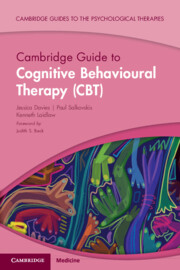Book contents
- Cambridge Guide to Cognitive Behavioural Therapy (CBT)
- Cambridge Guides to the Psychological Therapies
- Reviews
- Cambridge Guide to Cognitive Behavioural Therapy (CBT)
- Copyright page
- Contents
- Foreword
- A Note from the Series Editor
- Part I An Overview of the Model
- Part II Putting the Model of Cognitive Behavioural Therapy into Practice
- Part III Application and Adaptations for Mental Health Presentations
- Part IV Application of Cognitive Behavioural Therapy in Different Populations and Settings
- Chapter 22 Adaptations for Specific Populations
- Chapter 23 Evidence-Based Age-Appropriate Cognitive Behavioural Therapy with Older People
- Chapter 24 Using Cognitive Behavioural Therapy with Family Caregivers of Persons Living with Dementia
- Chapter 25 Cognitive Behavioural Therapy for Children and Young People
- Chapter 26 Adaptations for Specific Events: Immediately after a Traumatic Event
- Chapter 27 Cognitive Behavioural Therapy in Primary Care
- Chapter 28 Group Cognitive Behavioural Therapy
- Chapter 29 Conjoint Format: Couple’s Therapy
- Chapter 30 Internet and Telephone Delivery
- Chapter 31 Computerised CBT Self-Help Approaches
- Chapter 32 Developing and Progressing as a Cognitive Behavioural Therapy Therapist
- Index
- References
Chapter 32 - Developing and Progressing as a Cognitive Behavioural Therapy Therapist
from Part IV - Application of Cognitive Behavioural Therapy in Different Populations and Settings
Published online by Cambridge University Press: 18 November 2025
- Cambridge Guide to Cognitive Behavioural Therapy (CBT)
- Cambridge Guides to the Psychological Therapies
- Reviews
- Cambridge Guide to Cognitive Behavioural Therapy (CBT)
- Copyright page
- Contents
- Foreword
- A Note from the Series Editor
- Part I An Overview of the Model
- Part II Putting the Model of Cognitive Behavioural Therapy into Practice
- Part III Application and Adaptations for Mental Health Presentations
- Part IV Application of Cognitive Behavioural Therapy in Different Populations and Settings
- Chapter 22 Adaptations for Specific Populations
- Chapter 23 Evidence-Based Age-Appropriate Cognitive Behavioural Therapy with Older People
- Chapter 24 Using Cognitive Behavioural Therapy with Family Caregivers of Persons Living with Dementia
- Chapter 25 Cognitive Behavioural Therapy for Children and Young People
- Chapter 26 Adaptations for Specific Events: Immediately after a Traumatic Event
- Chapter 27 Cognitive Behavioural Therapy in Primary Care
- Chapter 28 Group Cognitive Behavioural Therapy
- Chapter 29 Conjoint Format: Couple’s Therapy
- Chapter 30 Internet and Telephone Delivery
- Chapter 31 Computerised CBT Self-Help Approaches
- Chapter 32 Developing and Progressing as a Cognitive Behavioural Therapy Therapist
- Index
- References
Summary
The chapter will help you to be able to explain the meaning of therapist competence and meta-competence, differentiate the experiences required to enhance competence based on the DPR model of skills development, define the value of CPD, patient feedback, supervision and SP/SR in furthering therapist competence, and maximise your own learning opportunities in relation to identified gaps.
Information
- Type
- Chapter
- Information
- Cambridge Guide to Cognitive Behavioural Therapy (CBT) , pp. 376 - 383Publisher: Cambridge University PressPrint publication year: 2025
